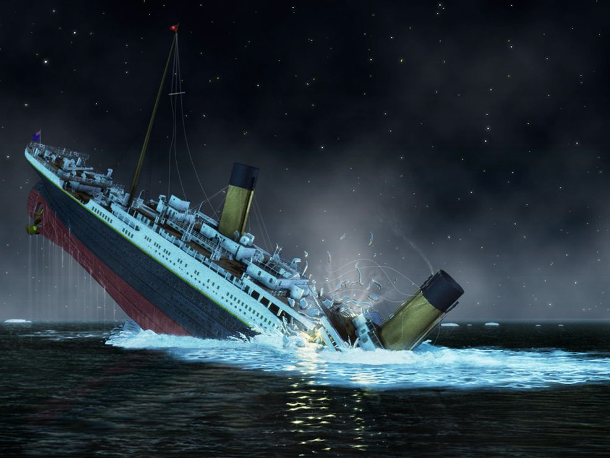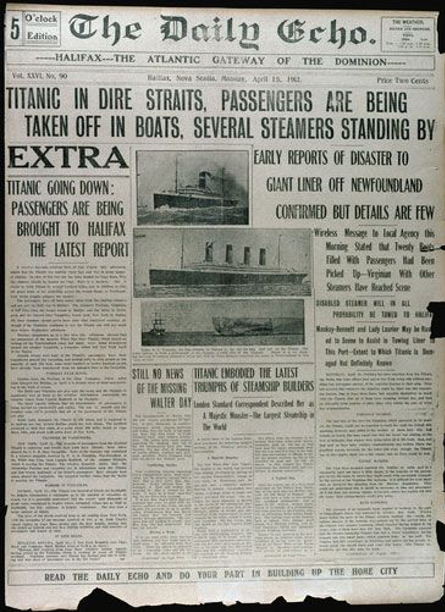


As the impact of the Coronavirus takes hold in London followed closely by the West Midlands and with the number of positive cases and death toll rising daily. I keep seeing images of the Titanic in my minds’ eye which seems to be playing tricks with me, as I can clearly see this magnificent ship listing to the right with people falling off the top deck whilst trying to lower themselves down the ship’s sides; people trapped in the 3rd class decks screaming for help and others in the water drowning – a lucky few people, both men and women, manage to scramble into the lifeboats before they are dropped into choppy waters crying as they see the unsinkable ship begin to go down. The famous sentence from the Stevie Smith’s poem seems a fitting title for this piece.
When a friend of mine asked me where I was in the picture, this global tragedy comes into even sharper focus. I see myself and my Ubele Initiative colleagues attempting to throw a few lifebuoys to hundreds of sinking Black and Minority ethnic organisations. Most miss their target as people and organisations drown, not because, as the common jokes goes, Black people can’t swim, but because despite their best efforts the odds were stacked against them; they were already weighed down before the tragedy hit – weighed down with the burden of trying to offer much needed community-based services and support yet overlooked by those secure in their wealth.

After the heady days of the 70s to 90s when ‘race equality’ and ‘anti-racist’ initiatives were both part of the main course on a ‘first class’ menu, the following 20 years saw a more palatable diet of diversity and equality being introduced, washed down with neo-liberalism, competitive commissioning as well as austerity measures. The net effect was a seriously weakened third sector and as with the survival of the fittest (or in the case of the Titanic), those who started off with the most privilege we’re more likely to survive. The Coronavirus has seen the whole sector hit the iceberg head on (and the Government offer of £750m to the charity sector falls woefully short of the £3.4bn needed it will inevitably pit groups against each other). A recent article by the Runnymead Trust succinctly outlines the impact on Black and Minority communities – it will amplify and deepen existing inequalities in health, education, housing etc. Research completed by Murray (2020) cites research that shows some 30% of people infected with the Coronavirus in the UK are from BAME communities.
Black and minority ethnic organisations (even those which have operated over the past 20 years) seem like old barges starved of new investment and now find themselves shattered into pieces and sinking. They were starved of investment to help transform into the new shiny ships that were being built in urban as well as rural spaces across the UK. Ubele’s ongoing research into the impact of Covid-19 shows struggling BAME organisations without even a lifebuoy to keep them afloat. Those few surviving organisations (many which have been in existence for up to four decades) have ended up rudderless without a clear steer as survival has - in some instances their very missions are a drift. To rescue the BAME third sector, locally, regionally and nationally, we need more than lifeboats – we need a refit; a strong keel, a new rudder for a new direction, an anchor to ride the current and future storms.
Disasters create a myriad of tragic stories – stories of death, bereavement, families in crisis, food shortages, isolation, loneliness, technological challenges – this list goes on. However, they can also create phoenix like opportunities. The current crisis sheds an unforgiving light on funders’ persistent under-investment in the BAME sector (which is being unflinchingly challenged by groups such as Charity So White and their Call to Action). Consequently, the BAME sector is fractured and somewhat disorganised, raising fundamental questions about infrastructure support needs, today and in the future.
We hope to be able to lower a few dinghies and save more of our target group over the crucial weeks and months ahead. We have been proactive in response, not only undertaking practical research amongst the BAME community nationally but through launching new initiatives. In addition to the research to identify needs and clarify priority actions to support BAME communities, we are developing a raft of support measures. However, when life returns to some semblance of normality, we need to have an honest and open national conversation about what the BAME sector should look like and what we need to do to make this happen. We need to campaign for a 20-year strategy and the financial investment required to deliver it.
The sinking of the Titanic taught the whole world important lessons. The Covid-19 pandemic could offer all of us a chance for real transformational change. How we navigate the next few weeks and months will determine whether the iceberg will break us or make us; it’s not too late for us to work together to change the ending of this fast unfolding story.
About the author:
Yvonne Field is the Founder and Managing Director of The Ubele Initiative (www.ubele.org). She has spent the past 40 years supporting the development of individuals, groups and organisations. Yvonne is passionate about social justice and equality issues and has worked across the UK, the Caribbean region and in Africa.
9th April 2020
Notes:
Murray, K., 2020, Covid-19 Update April 2020.
Haque Zubaida, Coronavirus will increase race inequalities, 26 Mar, 2020
https://www.runnymedetrust.org/blog/coronavirus-will-increase-race-inequalities
COVID-19: SUPPORTING BAME COMMUNITIES
Images source: https://www.nationalgeographic.org/media/sinking-of-the-titanic/